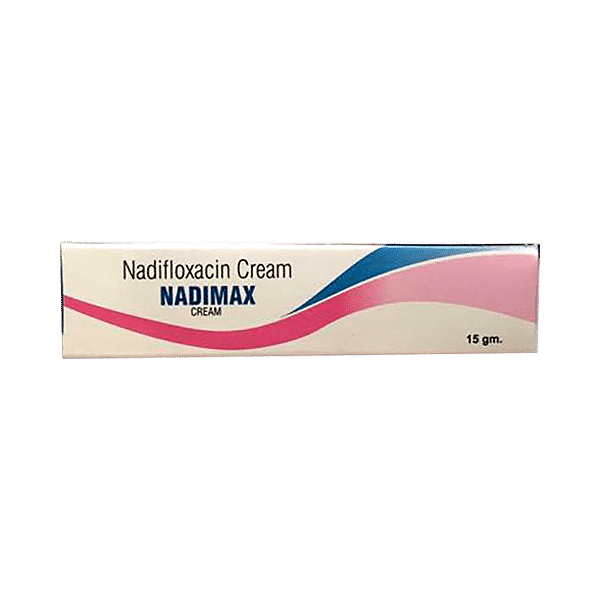
Nadimax Cream
Manufacturer
Zee Laboratories
Salt Composition
Nadifloxacin
Key Information
Short Description
Nadimax Cream is an antibiotic that helps in the treatment of bacterial skin infections by stopping the further growth of the causative microorganisms.
Dosage Form
Cream
Introduction
Nadimax Cream is for external use only. You should use it in the dose and duration as advised by your doctor. The affected area should be clean and dry before application of the ointment. You must wash your hands thoroughly before and after applying this medicine. Some common side effects include burning sensation, irritation, itching, and redness at the site of application. Please consult your doctor if these side effects persist for a longer duration. Do not use it in the eyes, mouth, or nose as it may irritate. If accidental exposure occurs, rinse immediately with plenty of water.
Directions for Use
This medicine is for external use only. Use it in the dose and duration as advised by your doctor. Check the label for directions before use. Clean and dry the affected area and apply the cream. Wash your hands after applying unless hands are the affected area.
Safety Information
Side Effects
It may cause temporary burning, itching, or redness at the application site. This is usually mild. Consult your doctor if you experience a more severe reaction.
Breastfeeding Warning
Nadimax Cream is probably unsafe to use during breastfeeding. Limited human data suggests that the drug may pass into the breastmilk and harm the baby.
Pregnancy Warning
Nadimax Cream may be unsafe to use during pregnancy. Although there are limited studies in humans, animal studies have shown harmful effects on the developing baby. Your doctor will weigh the benefits and any potential risks before prescribing it to you. Please consult your doctor.
Interacting Medicines
Rasagiline Selegiline Tizanidine Strontium Chloride
How it works
Nadimax Cream is an antibiotic. It kills the bacteria that cause skin infections by preventing the bacterial cells from dividing and repairing.
Quick Tips
Don't use it more often or for longer than advised by your doctor. Inform your doctor if your skin problem hasn't improved after seven days of treatment. Don't apply it to broken skin and take care to avoid getting it in your eyes, nose, or mouth. Don't cover the area being treated with airtight dressings such as bandages unless directed by a doctor as this may increase the risk of side effects.
Frequently asked questions
How to use Nadimax Cream?
Before applying Nadimax Cream, cleanse and dry the affected area. Gently massage it into the skin until fully absorbed. Avoid contact with eyes or mouth. If Nadimax Cream gets into your eyes, rinse thoroughly with water and seek immediate medical advice if irritation persists. Consult your doctor for any concerns or before using in infants.
Is Nadimax Cream effective for acne?
Yes, Nadimax Cream is an FDA-approved medication that has been proven to be effective for treating acne vulgaris. It's well-tolerated and safe when used as directed by a healthcare professional.
What precautions do I need to take while using Nadimax Cream?
Carefully avoid getting Nadimax Cream in your eyes or mouth. If it gets into your eyes, rinse immediately with water and contact your doctor. Do not use Nadimax Cream if you are allergic to it or any of its ingredients. Inform your doctor about any allergies you experience while using the medication. Tell your healthcare provider about all medications you take regularly for potential interactions. Do not cover the treated area with a bandage, as this may increase absorption and potential side effects. Do not use more than prescribed to alleviate symptoms quickly. Using additional dosage can increase the likelihood of unwanted side effects.
What should I do if I forget to use Nadimax Cream?
If you miss a dose of Nadimax Cream, don't worry and apply it as soon as you remember. However, if you have any other questions or concerns, please consult your doctor.
Is Nadimax Cream safe?
Nadimax Cream is generally safe when used exactly as directed by a healthcare professional. Always follow the prescribed dose and duration of treatment and report any side effects or concerns to your doctor.
Can I stop using Nadimax Cream when I feel better?
No, do not stop using Nadimax Cream without consulting your healthcare provider. Even if you are feeling better, the infection may not be completely cured and stopping treatment prematurely can lead to its resurgence or worsening of symptoms.
Is Nadimax Cream effective?
Nadimax Cream is effective if used in accordance with the prescribed dosage and duration by your healthcare professional. Do not stop taking it simply because you experience improvement, as the infection may not be fully cleared even when symptoms subside.


